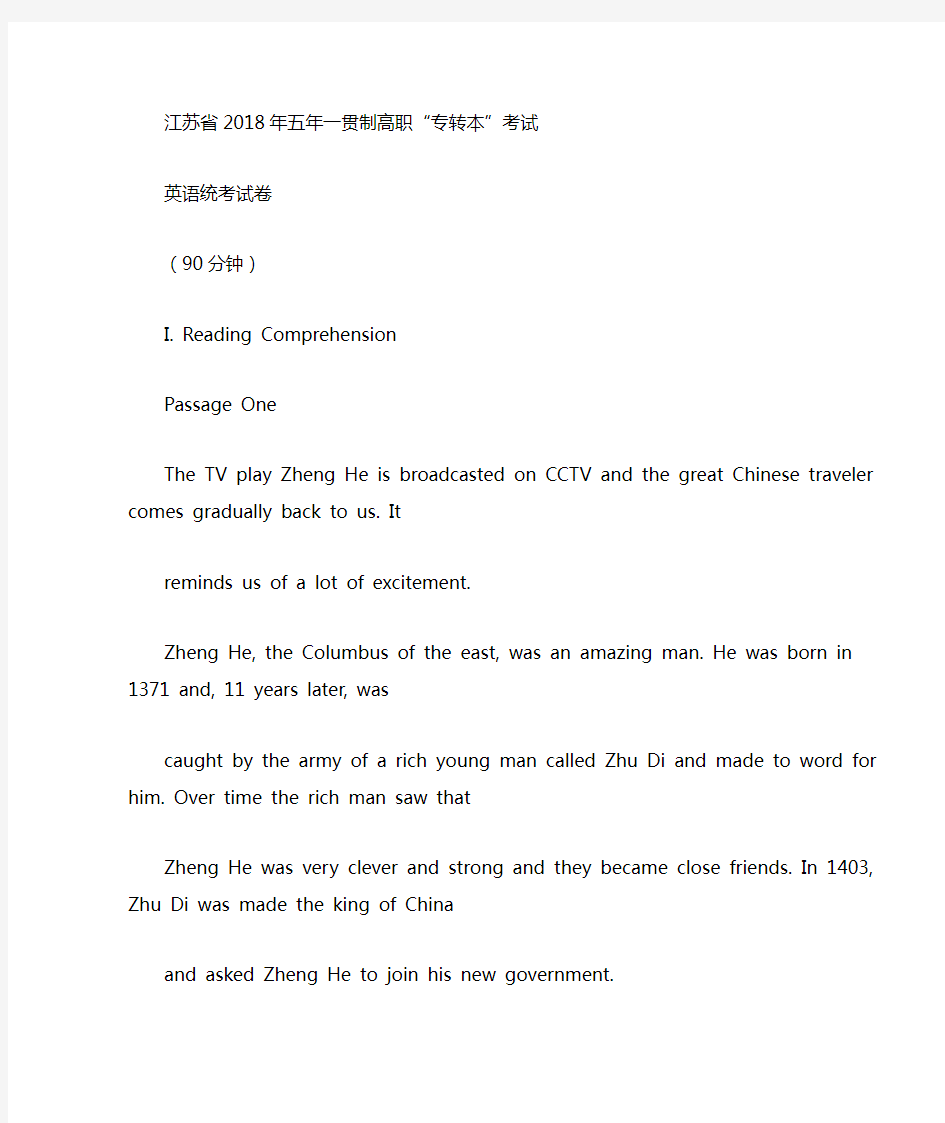
2018江苏五年制专转本英语统考真题
- 格式:doc
- 大小:26.41 KB
- 文档页数:7


江苏省2018年五年一贯制高职“专转本”考试
英语统考试卷
(90分钟)
I. Reading Comprehension
Passage One
The TV play Zheng He is broadcasted on CCTV and the great Chinese traveler comes gradually back to us. It
reminds us of a lot of excitement.
Zheng He, the Columbus of the east, was an amazing man. He was born in 1371 and, 11 years later, was
caught by the army of a rich young man called Zhu Di and made to word for him. Over time the rich man saw that
Zheng He was very clever and strong and they became close friends. In 1403, Zhu Di was made the king of China
and asked Zheng He to join his new government.
The King wanted to learn more about the world and show other countries his power. He ordered many new
ships to be built and made Zheng He the leader. Between 1405 and 1433, he led seven sea ships to different parts
of the world. He certainly traveled to India, Africa and the Middle East. Some people insist that his ships may
have even reached South Africa and Australia.
Each trip lasted between two and four years and it is believed he sailed more than 50,000 kilometers during
his travels. With 28,000 men and over 300 ships, such as boats for food, water and even soldiers' horses, Zheng
He led a fleet whose size would not be equaled by Europeans for over 500 years.
On these trips, he brought with him many Chinese goods like silk and medicine to give to the foreign kings
or to sell for local goods. He returned from each trip with boats filled with expensive things such as gold and
jewellery, foreign guests and strange animals like a giraffe.
It is a pity that we may never learn everything about Zheng He's travels. After he died in 1433, the new king,
who thought these trips were unlucky and cost too much, had them stopped and he burned almost all the books
about Zheng He's travels. It is only in the last 50 years, that historians have carefully studied the adventures of the
great Zheng He.
1. Why did the Chinese King order Zheng He to sail to many different countries?
A. To bring new countries under the control of China.
B. To show the world his power.
C. To receive gifts from the kings of other countries.
D. To discover unusual animals.
2. What do we know about Zheng He from the passage?
A. He sailed across the world.
B. Each of the trips lasted one year.
C. He died at the age of 62.
D. He was a successful soldier.
3. Which of the following did Zheng He bring with him from China?
A. Gold
B. Jewellery
C. Medicine
D. Giraffes
4. What happened after Zheng He died?
A. He was forgotten forever.
B. His ships were all destroyed.
C. The new king wrote a book about him
D. Sea trips to foreign countries were stopped.
5. In what order did the following happen?
a. Zhu Di become the King.
b. Zheng He was caught by soldiers.
c. The books about Zheng He were all burne
d.
5
/ 1.
d. Foreigners were invited to China.
e. Zheng He visited India.
f. New ships were built.
A. e-b-a-f-d-c
B. b-a-e-d-c-f
C. f-a-b-d-c-e
D. b-a-f-e-d-c
Passage Two
When John was growing up, other kids feel sorry for him. His parents always had him weeding the garden,
carrying out the rubbish and delivering newspapers. But when John reached adulthood, he was better off than his
childhood playmates. He had more job satisfaction, a better marriage and was healthier. Most of all, he was
happier. Far happier.
These are the findings of a 40-year study that followed the lives of 456 teenage boys from Boston. The study
showed that those who had worked as boys enjoyed happier and more productive lives than those who had not.
“Boys who worked in the home or community gained competence (能力) and came to feel they were worthwhile
members of society,”said George Vaillant, the psychologist (心理学家) who made the discovery, “And because
they felt good about themselves, others felt good about them.”
Vaillant's study followed these males in great detail. Interviews were repeated at ages 25, 31 and 47. Under
Vaillant, the researchers compared the men's mental-health scores with their boyhood-activity scores. Scores were